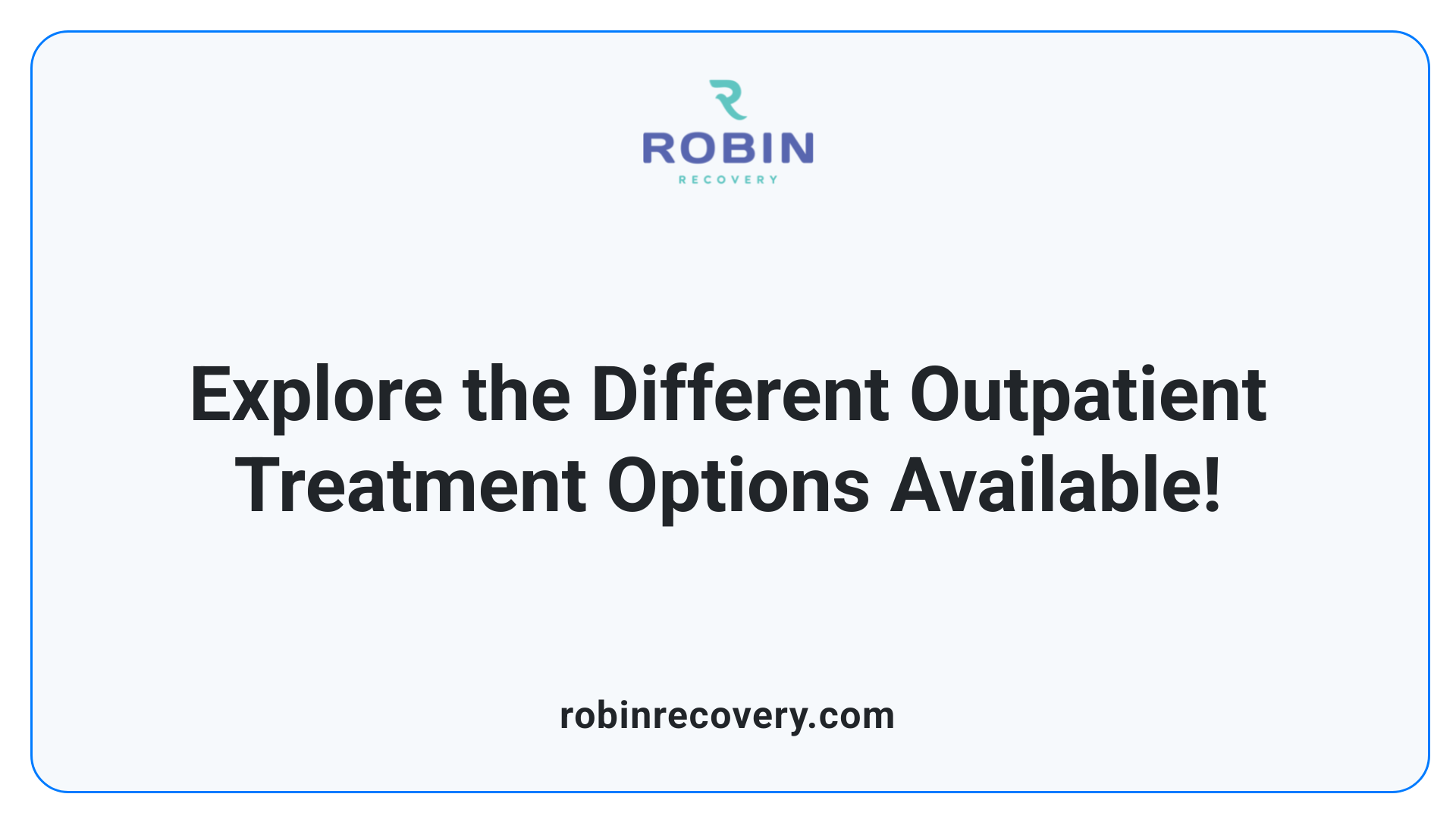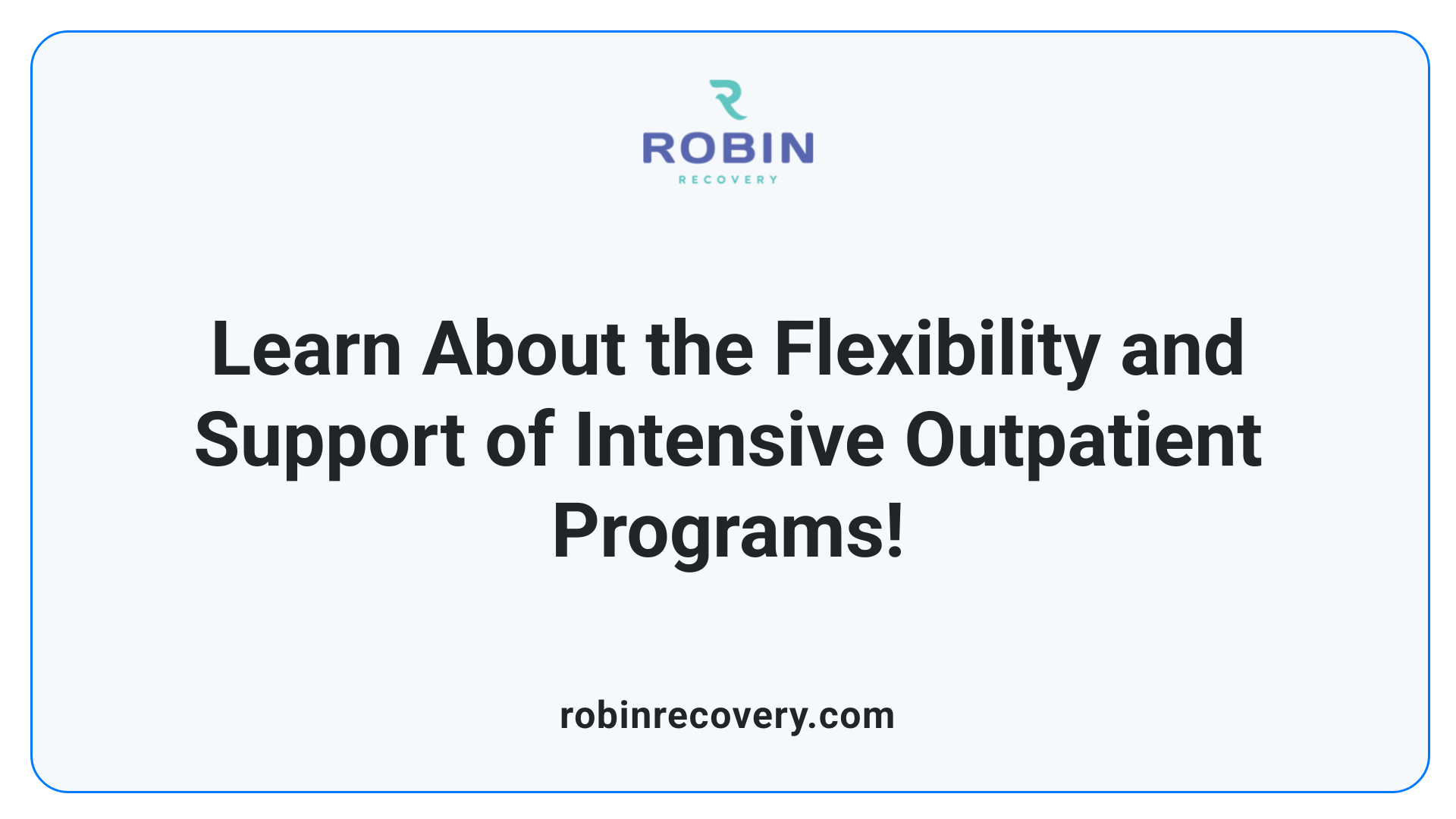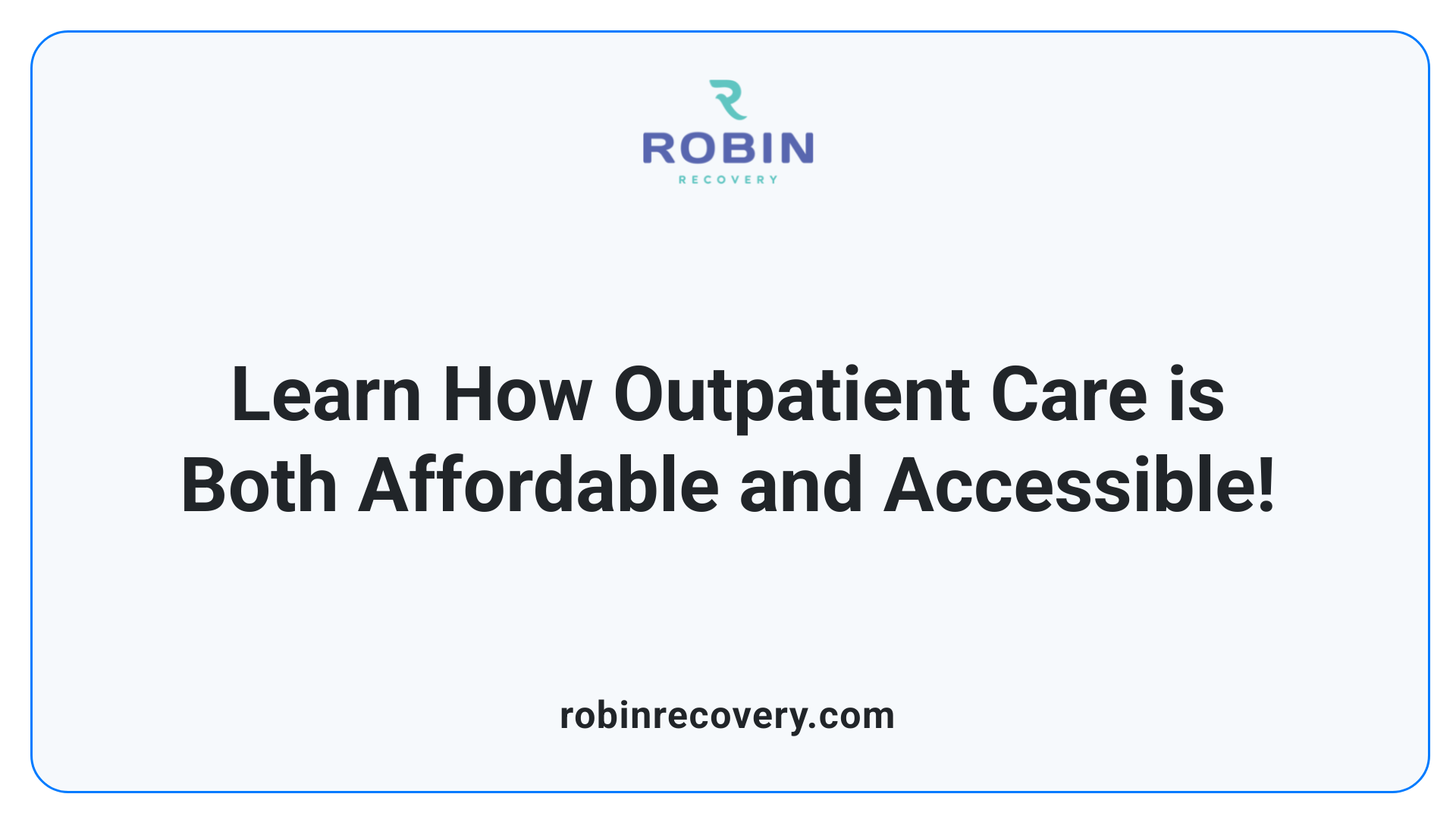How Outpatient Programs Provide Flexibility in Addiction Treatment

Introduction
Outpatient programs in addiction treatment offer a unique blend of comprehensive support and flexible scheduling, making them an attractive choice for individuals facing substance abuse issues. These programs allow participants to receive necessary therapeutic interventions while maintaining their daily responsibilities, providing a viable option for those who cannot commit to full-time residential treatment. This article explores the various outpatient options available, their benefits, and how they integrate recovery into individuals' lives.
Understanding Outpatient Treatment Options

What are the types of outpatient programs?
Outpatient treatment encompasses several types of programs tailored to different needs:
- Partial Hospitalization Programs (PHP): These require attendance for up to six hours per day, several days a week. PHPs suit individuals requiring close supervision while still returning home each evening.
- Intensive Outpatient Programs (IOP): With several sessions per week lasting two to four hours, IOPs provide more support than standard outpatient therapy, allowing individuals to balance therapy with their everyday commitments.
- Standard Outpatient Programs (OP): Typically, OPs involve fewer sessions, usually once or twice a week for about an hour. This option is ideal for those with minimal clinical needs or for those transitioning from more intensive care.
How do these programs differ in structure and intensity?
The structure and intensity of outpatient programs can vary significantly. PHPs offer a more intensive schedule with daily visits, while IOPs provide flexibility with structured treatment schedules. Standard outpatient programs are less demanding, allowing for easy integration into daily life.
Program Type Frequency of Sessions Duration per Session Ideal For PHP Daily Up to 6 hours High supervision needs IOP Several times a week 2-4 hours Moderate support required OP 1-2 times a week About 1 hour Minimal clinical needs
How does outpatient rehab work compared to inpatient rehab?
Outpatient rehab allows individuals to attend treatment during the day while returning home each night, providing flexibility that enables them to maintain their jobs and daily responsibilities. In contrast, inpatient rehab requires patients to stay at the facility for the treatment duration, which can offer a more immersive recovery environment. Outpatient programs can vary in intensity, ranging from standard sessions once or twice a week to intensive outpatient programs requiring attendance several days a week. Furthermore, outpatient treatment includes various components such as individual and group therapy, family therapy, and medication-assisted treatment, focusing on the whole person. Overall, outpatient rehab tends to be less expensive than inpatient options and offers the added benefit of allowing individuals to remain connected to their family and support systems during recovery.
The Benefits of Outpatient Facilities

What are the benefits of using outpatient facilities?
Outpatient facilities offer several significant advantages, making them an increasingly popular choice for patients seeking treatment. One of the primary benefits is cost-effectiveness. Outpatient programs generally incur lower expenses compared to inpatient care, reducing the financial burden for individuals and families, particularly those with limited insurance coverage.
Patients also enjoy convenience and flexibility within outpatient treatment. They can attend therapy sessions or medical appointments without the need for extended hospital stays. This setup allows individuals to maintain their daily responsibilities, such as work, school, and family commitments, significantly easing the treatment process.
How do outpatient and inpatient care costs compare?
Type of Care Typical Cost Features Outpatient Treatment Generally lower Flexible scheduling, home environment, no overnight stays Inpatient Treatment Usually higher 24/7 care, structured environment, overnight accommodations
Overall, outpatient treatment is often more accessible, especially for individuals concerned about financial implications, making it an appealing choice.
How does outpatient treatment impact daily life responsibilities?
Outpatient programs allow individuals to integrate therapy into their lives seamlessly. They can schedule sessions around their work or school hours, thereby minimizing disruption to personal and professional lives. This flexibility encourages better adherence to treatment, enabling patients to apply coping strategies and skills learned during therapy in real-world situations. Moreover, maintaining a home environment during recovery supports a strong support system, which is crucial for success in overcoming challenges associated with addiction or mental health issues.
Intensive Outpatient Programs: Balancing Structure and Freedom

What is the purpose of an Intensive Outpatient Program (IOP)?
Intensive Outpatient Programs (IOPs) serve as a crucial treatment option for individuals dealing with mental health issues and substance abuse. They provide a structured environment where participants engage in therapy designed to address addiction and mental health needs. This setup facilitates a smoother transition from inpatient care to independent living while significantly reducing the risk of future hospitalizations.
The purpose of the IOP is not only to offer clinical support but also to foster independence. It enhances recovery by integrating therapeutic practices into individuals’ everyday lives, enabling them to apply learned skills in real situations, which supports long-term sobriety and mental well-being.
How flexible is the scheduling of IOPs?
Flexibility is a cornerstone of Intensive Outpatient Programs. At facilities such as Southern California Hospital at Van Nuys, IOP scheduling accommodates the personal and professional commitments of participants. The program operates Monday through Friday with two distinct tracks:
Track Schedule Track 1 9:30 a.m. – 1:30 p.m. Track 2 1:00 p.m. – 4:30 p.m.
This adaptability allows individuals to maintain their daily routines, which is especially beneficial for those balancing work, school, or family obligations. Participants gain the advantage of structured support without the need to compromise their responsibilities.
How are treatment plans individualized in IOPs?
Each participant in an IOP receives a tailored treatment plan reflecting their specific needs and circumstances. The process often includes regular assessments to ensure that the recommended therapies are effective and align with the individual’s recovery goals.
Therapy options may include cognitive behavioral therapy and dialectical behavior therapy, focusing on skills for relapse prevention and emotional regulation. This individualized approach is crucial for building a solid foundation in recovery, allowing participants to form and strengthen the necessary skills to navigate challenges successfully.
Standard Outpatient Programs for Continued Recovery
Role of standard outpatient programs (OP)
Standard Outpatient Programs (OP) provide a vital source of support for individuals striving for continued recovery from addiction. These programs typically involve therapy sessions once or twice a week, each lasting about an hour. This setup is designed to cater to those who may have minimal clinical needs while still benefiting from structured care.
Suitability for those with minimal clinical needs
OP is particularly suited for individuals who do not require intensive support but wish to maintain accountability in their recovery journey. This makes these programs ideal for patients who have made significant progress and seek to reinforce their recovery strategies without the demands of more intensive treatment.
Transitioning from more intense care
For individuals transitioning from higher levels of care, like Partial Hospitalization Programs (PHP), OP offers a gentle pathway back to daily life. It allows them to practice skills learned during more intensive treatment in a less structured environment, bolstering their confidence as they return to their regular routines.
Cost-Effectiveness and Accessibility of Outpatient Care

Affordable treatment options
Outpatient programs offer a financially viable alternative to inpatient rehabilitation. Without the expenses related to accommodations and continuous supervision, individuals can receive effective treatment at a lower cost. Many outpatient options are specifically designed to accommodate people with budget constraints, which includes sliding scale fees to ensure that financial issues do not become barriers to treatment.
Insurance coverage possibilities
A significant aspect of outpatient care affordability is the potential for insurance coverage. Many health insurance plans include outpatient rehab services, reducing the out-of-pocket expenses for participants. This coverage typically extends to various therapy modalities, making it easier for individuals to access the help they need without overwhelming financial burdens.
Impact on long-term recovery
The cost-effectiveness of outpatient treatment can positively influence long-term recovery outcomes. By easing financial stress, these programs encourage continuous support and follow-up care that are crucial for sustained sobriety. Participants can maintain a connection with their support networks, further promoting accountability and stability in their recovery journey.
Family and Community Support in Outpatient Programs

Importance of Maintaining Support Networks
One of the standout benefits of outpatient programs is their emphasis on family and community support. Engaging with family and friends during treatment promotes a healing environment. This support network is crucial for emotional stability, helping individuals adhere to their treatment goals and empowering them to stay accountable throughout their recovery journey.
Role of Family in Recovery
Family members often play a pivotal role in recovery within outpatient settings. They contribute by providing love, encouragement, and understanding, which can significantly reduce feelings of isolation or shame often associated with addiction. Regular family therapy sessions can also enhance communication around challenges and successes, making the collective journey towards recovery more cohesive.
Community Integration
Outpatient programs encourage participants to stay integrated with their communities. This fosters a sense of belonging and provides additional social support. Many programs connect participants with local resources and peer recovery groups, facilitating lasting connections that extend beyond therapy. These networks not only offer encouragement but also share valuable experiences that resonate with participants, enriching the recovery journey.
Concluding Thoughts
Outpatient addiction treatment programs offer a versatile and accessible form of recovery for many individuals, balancing the need for effective therapeutic interventions with the ability to continue day-to-day life. Understanding and leveraging the benefits of these programs—such as cost-effectiveness, flexibility, and the potential for strong support networks—can significantly enhance recovery outcomes. As with any treatment decision, it's essential for individuals to assess their specific needs and circumstances to choose the most suitable program for their recovery journey.
References
- Understanding Outpatient Therapy: A Flexible Path to Recovery
- How Outpatient Programs Provide Flexibility in Addiction Recovery ...
- Beyond Rehab: Flexible Outpatient Care for Addiction Recovery
- Intensive Outpatient Programs for Addiction Recovery
- 5 Benefits of Outpatient: Real Examples of Flexibility and Community
- Chapter 3. Intensive Outpatient Treatment and the Continuum of Care
- Outpatient Rehab for Drugs & Alcohol Near You
